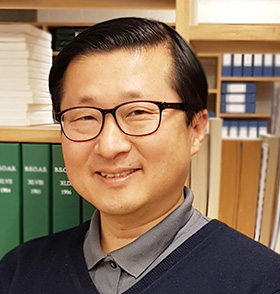
RESEARCH FELLOW
Professor Won began his legal career as an international law officer at the Office of General Counsel, Ministry of National Defense of Republic of Korea. After completing his law studies at Brooklyn Law School, he entered public prosecution service at the Kings County District Attorney’s Office, New York, U.S.A. as an Assistant District Attorney.
In 2001, Professor Won joined Handong International Law School, American J.D. style graduate law school in Korea, as a founding Associate Dean. In 2009, he took a leave from academia to serve the National Human Rights Commission of Korea as Director-General in charge of Human Rights Policy, Human Rights Education and International Human Rights Affairs. In 2013, he became a founding Director of Handong Institute for Peace and Reconciliation. Professor Won is an editorial broad member of the Korea Year of International Law, a publication of International Law Association Korean Society and a member of Advisory Board on International Humanitarian Law of Korea Red Cross.
Academic Disciplines
International Human Rights Law and North Korean Studies
Current Position
Professor of International Law
School of Law/ International Law School, Handong Global University, Korea
Focus
As a fellow of the Leiden Asia Centre, Professor Won conducts research on the issue of the children’s rights in North Korea from the international human rights perspective. The aim of the research is to produce an empirical legal research which could be used to improve the lives of children in North Korea. The research result and analysis would assist national, international policymakers, and stakeholders to make an informed and pragmatic human rights and humanitarian policy decision to engage North Korea, in particular addressing children as one of the most vulnerable groups.
Although North Korea has its own unique challenges, the research will show that there could be a functional transferable approach in improving human rights in North Korea. By creating a legal norm, establishing appropriate institutions, devising a comprehensive plan, and implementing child rights policies, there could be a substantial improvement in the situation of the children’s rights in North Korea. The research will further show that understanding international human rights norm and its implications on the field, national governments, donors, and policymakers could design, implement, monitor, and evaluate international human rights projects and humanitarian aids programs to make a difference on the ground level.
Method
The research is an empirical legal research based on a mixed method. The research examines the legal documents such as UN Convention on the Rights of the Child (CRC) , CRC General Comments, and North Korean Legal instruments. In order to better assess and to describe situations of North Korea, qualitative research methods such as a semi-structured in-depth interview, a case study, and an observation are used to bring a deeper insights into North Korean Children Rights situations and its socio- cultural context.

